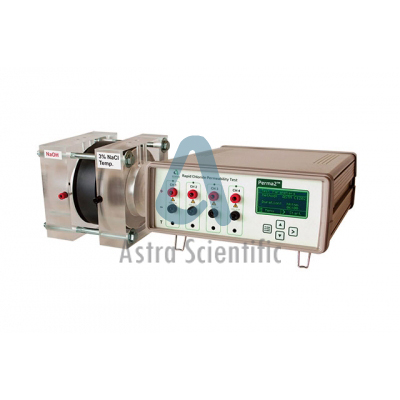
Description and Specification for Lab Tenders
Rapid Chloride Permeability Tester.
Specification:
offers rapid chloride permeability test apparatus. Rapid
Chloride Permeability Test equipment (RCPT) has multi-port testing
facilities is designed to test concrete samples of 100mm diameter with
50mm thickness for concrete ion permeability test. All the easy
connections are ready to use chloride ion permeability test instrument.
Customer can test up to three samples at a time as per ASTM C1202 -
electrical indication of concrete's ability to resist chloride ion
penetration, AASHTO T 277 - electrical indication of concrete's ability
to resist chloride ion penetration (Rapid Chloride Permeability Test)
and ASTM C 1760 - standard test method for bulk electrical conductivity
of hardened concrete.
All the cells are provided with connecting rubber gasket and washers for
achieving leak proof. Corrosion of reinforcing steel due to chloride
ingress is one of the most common environmental attacks that lead to the
deterioration of concrete structures. Concrete contains flying ash or
silica fumes are less permeability are less permeable to deleterious
elements and thus are more durable than conventional concretes.
Corrosion-related damage to bridge deck overlays, parking garages,
marine structures, and manufacturing plants results huge amount annually
on repairs, this durability problem has received widespread attention
in recent years because of its frequent occurrence and the associated
high cost of repairs. Chlorides penetrate crack-free concrete by number
of mechanisms: capillary absorption, hydrostatic pressure, diffusion,
and evaporative transport. Mainly diffusion occurs when the
concentration of chloride on the outside of the concrete member is
greater than on the inside. This results in chloride ions moving through
the concrete to the level of the rebar. When this occurs in combination
with wetting and drying cycles and in the presence of oxygen,
conditions are right for reinforcement corrosion. The rate of chloride
ion ingress into concrete is primarily dependent on the internal pore
structure.
The pore structure in turn depends on other factors such as the mix
design, degree of hydration, curing conditions, use of supplementary
cementitious materials, and construction practices. Therefore, wherever
there is a potential risk of chloride induced corrosion, the concrete
should be evaluated for chloride permeability. The rapid chloride-ion
permeability test (rcpt) is designed to assess the resistance of
concrete to the penetration of chloride ions, an indicator of its
permeability. Complete with tools kit.
RCPT apparatus is a fully self-contained test device complete for Rebar
manufacturers, civil engineering laboratories and R&D purpose as per
ASTM C1202, AASHTO T277 and ASTM C 1760.
Complete rapid chloride ion permeability tester includes the following items:
• RCPT test apparatus with 4 port (230~250 V AC power supply)
• Plexiglass chambers - 4 pairs
• 300mm vacuum desiccator
• Vacuum pump with gauge
• Moisture trap
• Temperature probe
• Tests sealant + gun acrylic sealer + brush
Rating of chloride permeability of concrete according to the rcpt test apparatus is as below:
|
Rating |
Typical concrete type permeability coulombs |
|
High |
>4000 high w-c ratio (> 0.6) conventional PC concrete |
|
Moderate |
2000 to 4000 moderate W-C ratio (0.40 to 0.50) conventional PC concrete |
|
Low |
1000 to 2000 low W-C ratio (< 0.40) conventional PC concrete |
|
Very low |
100 to 1000 latex-modified concrete, internally sealed concrete |
|
Negligible |
< 100 polymer-impregnated concrete, polymer concrete |
